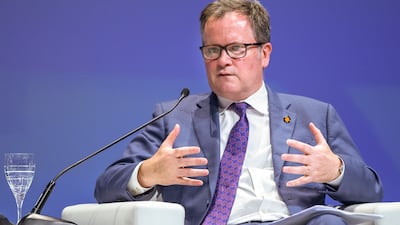Global oil demand may peak within the next 10 years, driven by increased consumption in developing nations offsetting declines in advanced economies, the chief executive of Vitol, the world’s largest energy trader, has said. Speaking during a panel session at the Abu Dhabi International Petroleum Exhibition and Conference (Adipec) on Tuesday, Russell Hardy highlighted the difficulty in accurately predicting peak oil demand, particularly due to uncertainties surrounding consumption growth rates in developing countries.
“What we're saying today is that peak oil demand is about 10 years away. The unfortunate thing is, we said five years ago that peak oil demand is 10 years away,” Mr Hardy said.
The pace of the shift from the combustion engine to other forms of transport in Organisation for Economic Co-operation and Development (OECD) countries will be the “most important driver of all of this”, he said. “We're reasonably confident demand growth in the non-OECD area is going to outstrip the demand shrinkage in the OECD,” Mr Hardy added.
Torbjorn Tornqvist, chief of commodities trading firm Gunvor, said demand for transportation fuels, such as diesel and gasoline, is plateauing in some markets, particularly China. But, it doesn't mean oil demand is changing because we see more demand for chemical feed stocks,” he said during the same panel.
The International Energy Agency has predicted that demand for oil, coal and gas will peak by 2030 amid growing adoption of EVs and renewable energy. The debate surrounding the future of oil demand has heated up in recent years, with Opec, the oil producers’ group, taking an opposing view.
On Monday, Opec's secretary general Haitham Al Ghais said he was confident about crude demand in the long term. "Economic growth [is] doing well despite all the talk about negative economic growth. Yes, there are some challenges, but the picture is not as negative as some make it sound," Mr Al Ghais said. "Peak demand is not going to happen, we're not going to have that because the world keeps growing," he added.
Chinese demand
After importing record amounts of crude in 2023, China’s oil demand has significantly slowed this year amid an economic slowdown and rapid adoption of EVs. The IEA expects global oil demand to expand by roughly 900,000 barrels per day this year and close to one million bpd in 2025, marking a sharp slowdown on the two million bpd growth observed in the post-pandemic period.
China “underpins” the deceleration in growth, representing around 20 per cent of global gains both this year and next year, compared to almost 70 per cent in 2023, the agency said in its monthly oil market report. “The reality is [that] Europe has certainly peaked on oil. The US probably has peaked or is peaking,” said Nick Wayth, chief executive of the Energy Institute, which publishes the Statistical Review of World Energy report every year.
“The one to watch is China. China is right to peak on oil demand this decade, and that becomes a really significant inflection point globally. India will continue to grow,” he told The National on the sidelines of Adipec. “We will reach peak oil, and I think it will be sooner than later.”








